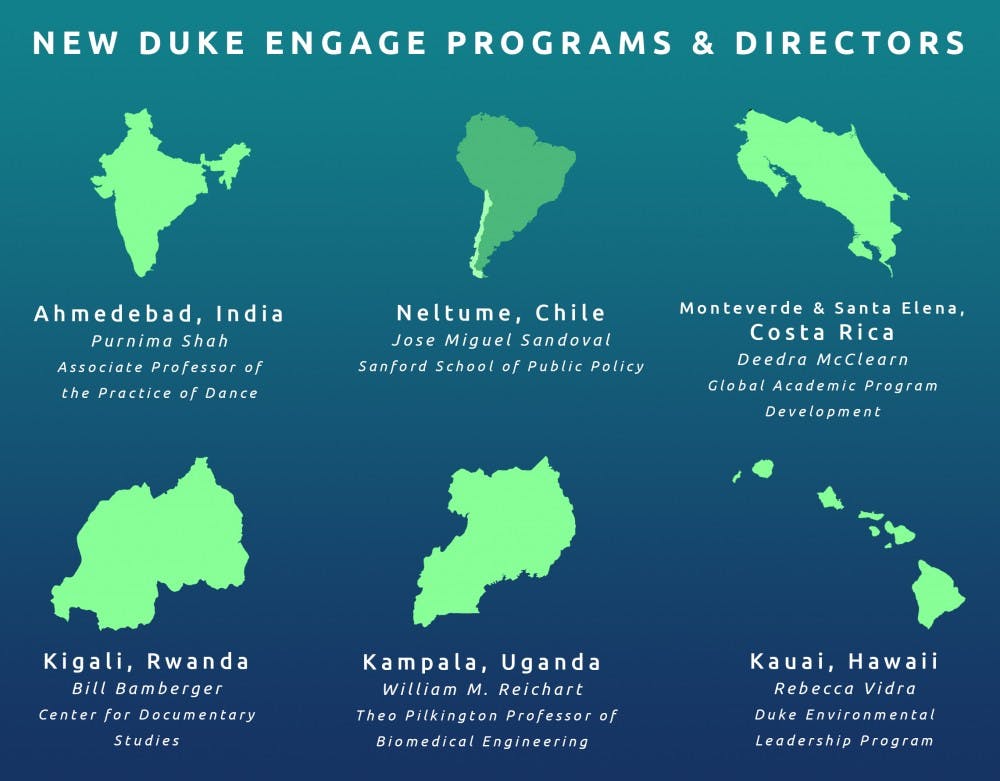Six new DukeEngage programs, including five international immersion programs and one in the United States, have been introduced for Summer 2017.
DukeEngage participants will be working in communities in Kauai, Hawaii; Monteverde and Santa Elena, Costa Rica; Neltume, Chile; Ahmedabad, India; Kigali, Rwanda and Kampala, Uganda. The overarching focuses of the programs range from sustainability and conservation efforts to women’s empowerment, children’s services and biotechnology in health care.
Jose Miguel Sandoval, a guest lecturer in the Sanford School of Public Policy, is the program director for the new DukeEngage program in Neltume, Chile.
“The expectation is to expose Duke students to serve this community and then serve society at large by being engaged in a project in an area that requires a little bit of help when it comes to increasing the social consciousness of nature conservation,” he said.
He noted that the program’s reach is twofold. It exposes students to fieldwork in both the social sciences and the natural sciences by having them help investigate endangered species. But it also allows participants to interact with and evaluate Neltume as it transitions from a logging community to one more reliant on ecotourism.
Sandoval said that he specifically chose the DukeEngage project to encourage attention on issues of conservation and sustainability efforts in the region. He noted that he plans to select participants who are willing to take a hands-on approach to service.
“[We want] the type of individual who is ready to put on some boots and go out on the field and take water samples and go out and capture photographs of little animals,” he said.
William M. Reichart, Theo Pilkington professor of biomedical engineering and the director for the new program in Uganda, explained in an email that he was inspired to create the DukeEngage program by his experiences as a Fulbright Scholar in the biomedical engineering program at Makerere University.
He wrote that he designed the program so that students could use their engineering skills to repair broken hospital equipment, identify the needs of the health sector and design efficient solutions.
Reichart wrote that he hopes that Duke students “see the people of Uganda for all their wonderfulness and challenges,” which can only be done by “being on the ground and directly interacting.”
First-year Divya Chowbey said she was excited about the creation of a program that focuses on medical instrumentation.
She said that because both DukeEngage Uganda and DukeEngage Tanzania focus on biotechnology students interested in the subject are “allowed to choose between two different forms of cultural immersion.” The Uganda program takes place in Kampala, the country’s capital, while the Tanzania program is a more rural setting.
The new program in Ahmedabad, India—led by Purnima Shah, associate professor of the practice of dance—aims to improve children’s education and empower women from low income groups to become financially independent.
She said that although there are no hard-core prerequisites for the program, the focus when reviewing applications will be to select students who are seriously looking to do service internships and engage with the community.
In addition, a new domestic program in Kauai, Hawaii was announced this year and will be led by Rebecca Vidra, director of the Duke Environmental Leadership Program.
Vidra echoed Shah’s and Reichart’s sentiments regarding the ideal participant in their respective DukeEngage programs, mentioning that she was interested in students who “can be open-minded.” Although her program’s location is in the United States, participants will be considered outsiders in the state, she said.
Two other international programs have been introduced: one in Costa Rica and another in Rwanda. DukeEngage Costa Rica is led by Deedra McClearn, director of Global Academic Program Development, and aims to conduct conservation work focused on water resources and tropical habitat restoration. DukeEngage Rwanda is directed by Bill Bamberger, visiting lecturer at the Center for Documentary Studies, with the intent of documenting the efforts of four non-profit organizations in the country.
Get The Chronicle straight to your inbox
Signup for our weekly newsletter. Cancel at any time.

